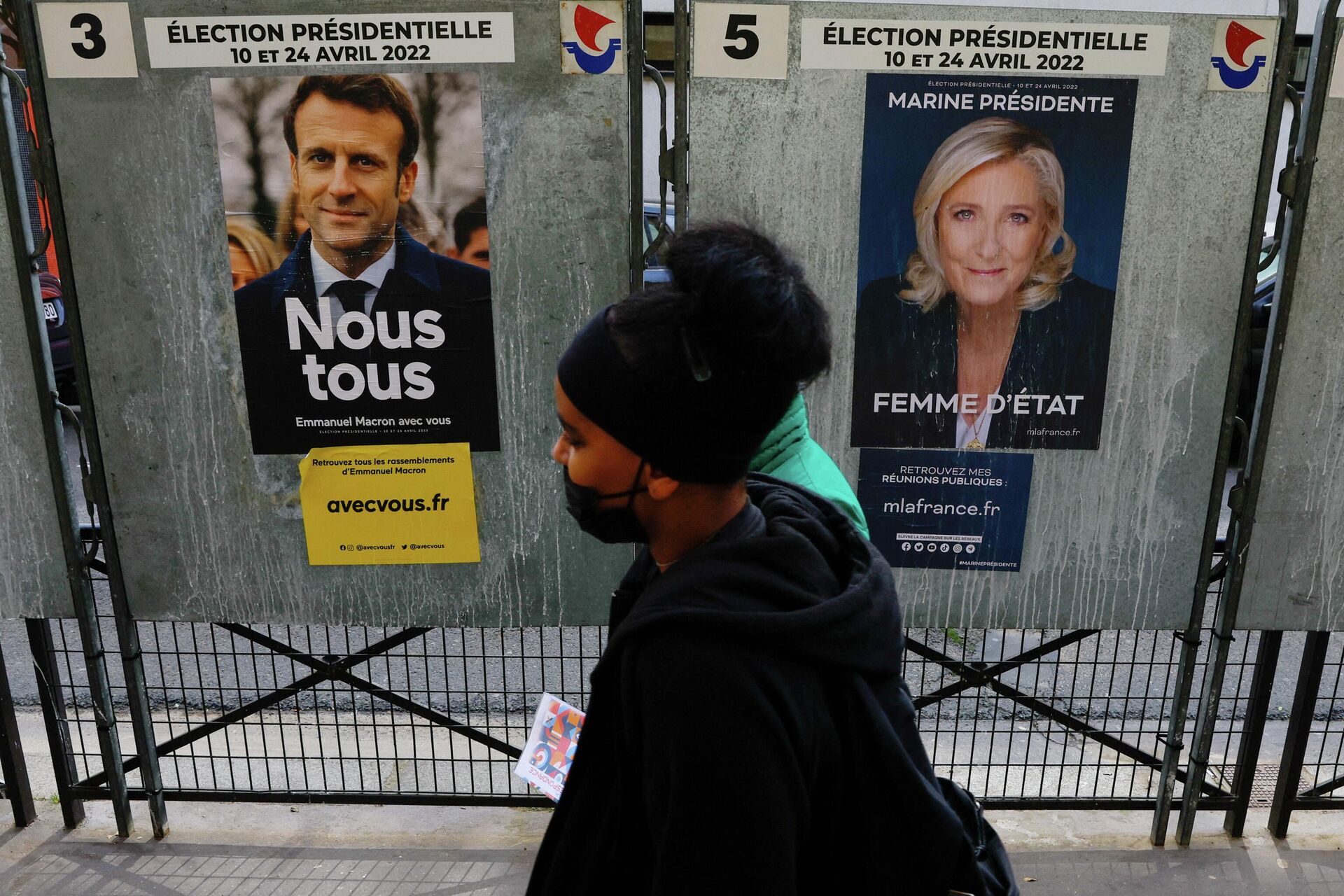https://sputnikglobe.com/20220419/inflation-crime--ukraine-crisis-what-could-bring-macron-down-and-pave-the-way-for-le-pen-1094891756.html
Inflation, Crime & Ukraine Crisis: What Could Bring Macron Down and Pave the Way for Le Pen?
Inflation, Crime & Ukraine Crisis: What Could Bring Macron Down and Pave the Way for Le Pen?
Sputnik International
French President Emmanuel Macron and Marine Le Pen, a member of the National Assembly for Pas-de-Calais, advance to the second and final round of France's... 19.04.2022, Sputnik International
2022-04-19T15:40+0000
2022-04-19T15:40+0000
2022-10-19T19:37+0000
world
opinion
europe
france
ukraine
russia
emmanuel macron
marine le pen
french presidential election
investigation
https://cdn1.img.sputnikglobe.com/img/105326/98/1053269803_0:263:5040:3098_1920x0_80_0_0_c723b3387becec03b92fd2482a5e6c56.jpg
Emmanuel Macron's victory is not certain, even though the French incumbent president managed to outperform his right wing rival in the first round, according to the latest survey by the Democracy Institute, a Washington- and London-based, politically independent research organization, conducted for the UK newspaper Daily Express.Sputnik: The Democracy Institute has found that Emmanuel Macron only has a two-point lead over Marine Le Pen, with 43% to 41%, while 16% of French voters are undecided and could opt either way. Given that Macron is a centrist and Le Pen is a right-wing politician, can we say that the French are drifting to the right side of the political spectrum? Why is conservatism becoming attractive to them, in your opinion?Patrick Basham: The French are unquestionably moving to the right, ideologically. This trend has been readily apparent for at least a decade. What is different about this trend is that it has not benefited the traditional centre-right parties. That is because the trend is not in the direction of very moderate, watered-down fiscal and social conservatism. Instead, the trend is in the direction of conservative nationalism and populism. The best example is the immigration issue, whereby most French citizens support restrictions on legal immigration and a crackdown on illegal immigration.Sputnik: According to your research, more worrying for Macron is that the votes of third place left-wing candidate Jean-Luc Mélenchon have split evenly between the two finalists, with 28% going to Macron and 26% going to Le Pen. What's behind left-wingers' readiness to vote for Le Pen, in your opinion?Patrick Basham: Left-wing French voters are as opposed to Macron as they are opposed to Le Pen, although for very different reasons. They dislike Macron’s economic policies, while they dislike Le Pen’s social policies. These left-wingers think that in 2017 Macron campaigned as a centre-left candidate, but he has governed as a centre-right president. As most of them supported Macron five years ago, to ensure Le Pen’s defeat, they feel extremely disappointed by Macron’s performance in office.Despite these voters’ staunchly Leftist bent, they echo many of Le Pen voters’ concerns about the political establishment, the ruling class, economic disparity and division, and undemocratic governance. In practice, these anti-system themes and sentiments transfer rather easily between left-wing and right-wing populism. This dynamic makes sense when one recalls the old adage about French politics resembling a horseshoe with comparatively little distance between the radical Left and the radical Right. Working-class voters, especially, often switch back-and-forth between the two extremes.Mélenchon’s voters also skew younger, which is an opening for Le Pen, who polls far better than Macron among young and middle-aged voters, and most Mélenchon’s voters share her Euroscepticism.Sputnik: You’ve found that Le Pen is faring better than Macron on several "most important" issues, including inflation, crime, jobs and immigration. Macron is viewed as a more favourable candidate only when it comes to healthcare and Ukraine. How could this pan out for the incumbent president, in your opinion?Patrick Basham: It is always a bad sign for a politician seeking reelection when most voters disagree with him on the issues that are of greatest concern to them. Frequently, such findings are a death knell for a candidate in Macron’s position. In this case, should most voters prioritise these issues when casting their ballots, it will be difficult for Macron to win. A candidate in this position may be saved, however, if there is another factor, or factors, at play that may overwhelm his unpopularity on the issues.On the issues, specifically, Macron is attempting to make the election about issues where he is less unpopular than Le Pen. Hence, his claims that she supports a French exit from the European Union, that she does not adequately support Ukraine in the conflict with Russia, and that she would scrap France’s climate change commitments.What may save the president is that French voters of the centre-left and the centre-right, as well as at least half of Mélenchon’s voters, so oppose Le Pen that they are willing to hold their noses and vote for Macron. Most Macron voters are voting against her, rather than in favour of him. Macron’s vote is a negative vote. However, Le Pen’s vote is a positive vote because the vast majority of her voters actually support her more than they dislike Macron, which is why her supporters are more enthusiastic about her candidacy than Macron supporters are about his candidacy.Sputnik: You said that if the next week is uneventful, Macron will be re-elected, whereas if someone or something disrupts the political week, Marine Le Pen will probably win the election. Could you explain your point in more detail? What sort of events could disrupt Macron's election odds? Did you mean domestic or international events or both?Patrick Basham: Macron currently leads Le Pen by a small margin, so the less that happens on the campaign trail, and the fewer external factors that influence the campaign, during the final few days of the race the less likely it is that voters reconsider their intentions and, therefore, the better his odds of victory. Le Pen, however, needs movement among the electorate to bring about enough change to secure an upset victory. Le Pen requires either some of those who are currently abstaining to decide to vote, and to vote for her, or an unexpected event to occur that makes a slice of Macron’s supporters reconsider their voting intentions.An influential event could be domestic or international, or both. The most obvious domestic event is Wednesday’s TV debate between the two candidates. Given the closeness of the contest to date, a knock-out performance by either candidate probably secures that candidate the presidency.Sputnik: Is Le Pen's victory possible in your opinion? If she wins, could she face the same level of resistance from the French establishment as Donald Trump between 2016 and 2021?Patrick Basham: A Le Pen victory is certainly possible. A slight uptick in her support, which is possible from several sources, would seriously threaten Macron’s reelection chances. The number of voters still undecided between Macron and Le Pen is quite high. When those undecided voters finally make up their minds, their decisions could turn a narrow Macron win into a comfortable victory; or, they could move in Le Pen’s direction to give her the victory.Studying our polling data, for Le Pen to upset Macron on Sunday requires, in my opinion, at least one of the following developments. She needs to beat Macron in the debate. If she does very well in the eyes of anti-Macron viewers, some of those planning to abstain will decide to vote for Le Pen, instead.It is also worth reminding ourselves that pollsters continue to underestimate the populist vote across Europe. A few years ago, it was Brexit. A couple of weeks ago, it was Hungarian Prime Minister Viktor Orban’s landslide win and Serbian President Aleksandar Vucic’s overwhelming re-election. Ten days ago, it was Mélenchon’s first round vote tally that nearly earned him a run-off spot. Is Le Pen’s populist vote also underestimated? Perhaps, it is.And, what is the truth behind the notion of a “Shy Le Pen” vote among Leftists? For some time, a segment of Mélenchon supporters, along with other far left voters, have been reluctant to tell pollsters they are voting for the (socially unacceptable) right-wing populist candidate. If such voters do exist in significant numbers, their presence will be felt especially, and crucially, in Mélenchon’s urban strongholds of Paris and Marseille.The first tangible hint of the treatment Le Pen may expect as president is the EU’s carefully choreographed attack on her this week. The Paris prosecutor is now investigating claims that she previously misused EU funds while she was a Member of the European Parliament. I expect Le Pen’s campaign to be the target of other such Deep State-style attacks over the campaign’s final days.
france
ukraine
russia
Sputnik International
feedback@sputniknews.com
+74956456601
MIA „Rossiya Segodnya“
2022
News
en_EN
Sputnik International
feedback@sputniknews.com
+74956456601
MIA „Rossiya Segodnya“
Sputnik International
feedback@sputniknews.com
+74956456601
MIA „Rossiya Segodnya“
opinion, europe, france, ukraine, russia, emmanuel macron, marine le pen, french presidential election, investigation, donald trump, conservatism, populism, interviews
opinion, europe, france, ukraine, russia, emmanuel macron, marine le pen, french presidential election, investigation, donald trump, conservatism, populism, interviews
Inflation, Crime & Ukraine Crisis: What Could Bring Macron Down and Pave the Way for Le Pen?
15:40 GMT 19.04.2022 (Updated: 19:37 GMT 19.10.2022) French President Emmanuel Macron and Marine Le Pen, a member of the National Assembly for Pas-de-Calais, advance to the second and final round of France's elections on 24 April. Patrick Basham, founding director of the Democracy Institute, has explained under what circumstances Le Pen could come out on top and what would happen next.
Emmanuel Macron's victory is not certain, even though the French incumbent president managed to outperform his right wing rival in the first round, according to the latest survey by the Democracy Institute, a Washington- and London-based, politically independent research organization, conducted for the UK newspaper Daily Express.
Sputnik: The Democracy Institute has found that Emmanuel Macron only has a two-point lead over Marine Le Pen, with 43% to 41%, while 16% of French voters are undecided and could opt either way. Given that Macron is a centrist and Le Pen is a right-wing politician, can we say that the French are drifting to the right side of the political spectrum? Why is conservatism becoming attractive to them, in your opinion?
Patrick Basham: The French are unquestionably moving to the right, ideologically. This trend has been readily apparent for at least a decade. What is different about this trend is that it has not benefited the traditional centre-right parties. That is because the trend is not in the direction of very moderate, watered-down fiscal and social conservatism. Instead, the trend is in the direction of conservative nationalism and populism. The best example is the immigration issue, whereby most French citizens support restrictions on legal immigration and a crackdown on illegal immigration.
Nationalist and populist conservatism are more attractive to the French because they have concluded that both centrist and socialist governments have failed to deliver either economic or personal security. French voters increasingly believe that traditional culture, personal safety, and economic prosperity are issues that the centre-left French political establishment does not care about, at least as far as these issues affect ordinary people.
Sputnik: According to your research, more worrying for Macron is that the votes of third place left-wing candidate Jean-Luc Mélenchon have split evenly between the two finalists, with 28% going to Macron and 26% going to Le Pen. What's behind left-wingers' readiness to vote for Le Pen, in your opinion?
Patrick Basham: Left-wing French voters are as opposed to Macron as they are opposed to Le Pen, although for very different reasons. They dislike Macron’s economic policies, while they dislike Le Pen’s social policies. These left-wingers think that in 2017 Macron campaigned as a centre-left candidate, but he has governed as a centre-right president. As most of them supported Macron five years ago, to ensure Le Pen’s defeat, they feel extremely disappointed by Macron’s performance in office.
The reason that Le Pen may receive almost as many votes as Macron from Mélenchon voters is that Mélenchon and Le Pen have something significant in common. They are both populists, albeit from opposite ends of the political spectrum. In stark contrast, Macron epitomises the detached technocratic elite that rules the country.
Despite these voters’ staunchly Leftist bent, they echo many of Le Pen voters’ concerns about the political establishment, the ruling class, economic disparity and division, and undemocratic governance. In practice, these anti-system themes and sentiments transfer rather easily between left-wing and right-wing populism. This dynamic makes sense when one recalls the old adage about French politics resembling a horseshoe with comparatively little distance between the radical Left and the radical Right. Working-class voters, especially, often switch back-and-forth between the two extremes.
Mélenchon’s voters also skew younger, which is an opening for Le Pen, who polls far better than Macron among young and middle-aged voters, and most Mélenchon’s voters share her Euroscepticism.
Sputnik: You’ve found that Le Pen is faring better than Macron on several "most important" issues, including inflation, crime, jobs and immigration. Macron is viewed as a more favourable candidate only when it comes to healthcare and Ukraine. How could this pan out for the incumbent president, in your opinion?
Patrick Basham: It is always a bad sign for a politician seeking reelection when most voters disagree with him on the issues that are of greatest concern to them. Frequently, such findings are a death knell for a candidate in Macron’s position. In this case, should most voters prioritise these issues when casting their ballots, it will be difficult for Macron to win. A candidate in this position may be saved, however, if there is another factor, or factors, at play that may overwhelm his unpopularity on the issues.
On the issues, specifically, Macron is attempting to make the election about issues where he is less unpopular than Le Pen. Hence, his claims that she supports a French exit from the European Union, that she does not adequately support
Ukraine in the conflict with Russia, and that she would scrap France’s climate change commitments.
What may save the president is that French voters of the centre-left and the centre-right, as well as at least half of Mélenchon’s voters, so oppose Le Pen that they are willing to hold their noses and vote for Macron. Most Macron voters are voting against her, rather than in favour of him. Macron’s vote is a negative vote. However, Le Pen’s vote is a positive vote because the vast majority of her voters actually support her more than they dislike Macron, which is why her supporters are more enthusiastic about her candidacy than Macron supporters are about his candidacy.
Sputnik: You said that if the next week is uneventful, Macron will be re-elected, whereas if someone or something disrupts the political week, Marine Le Pen will probably win the election. Could you explain your point in more detail? What sort of events could disrupt Macron's election odds? Did you mean domestic or international events or both?
Patrick Basham: Macron currently leads Le Pen by a small margin, so the less that happens on the campaign trail, and the fewer external factors that influence the campaign, during the final few days of the race the less likely it is that voters reconsider their intentions and, therefore, the better his odds of victory. Le Pen, however, needs movement among the electorate to bring about enough change to secure an upset victory. Le Pen requires either some of those who are currently abstaining to decide to vote, and to vote for her, or an unexpected event to occur that makes a slice of Macron’s supporters reconsider their voting intentions.
An influential event could be domestic or international, or both. The most obvious domestic event is Wednesday’s TV debate between the two candidates. Given the closeness of the contest to date, a knock-out performance by either candidate probably secures that candidate the presidency.
The international event that would damage Macron’s candidacy would be a crisis for France stemming from the country’s involvement in Ukraine. For example, should French citizens, in a very public fashion, be captured or held hostage this week in Ukraine, Macron’s candidacy may not survive such a humiliation for his government and the French nation.
Sputnik: Is Le Pen's victory possible in your opinion? If she wins, could she face the same level of resistance from the French establishment as Donald Trump between 2016 and 2021?
Patrick Basham: A Le Pen victory is certainly possible. A slight uptick in her support, which is possible from several sources, would seriously threaten Macron’s reelection chances. The number of voters still undecided between Macron and Le Pen is quite high. When those undecided voters finally make up their minds, their decisions could turn a narrow Macron win into a comfortable victory; or, they could move in Le Pen’s direction to give her the victory.
Studying our polling data, for Le Pen to upset Macron on Sunday requires, in my opinion, at least one of the following developments. She needs to beat Macron in the debate. If she does very well in the eyes of anti-Macron viewers, some of those planning to abstain will decide to vote for Le Pen, instead.
It is also worth reminding ourselves that pollsters continue to underestimate the populist vote across Europe. A few years ago, it was Brexit. A couple of weeks ago, it was Hungarian Prime Minister Viktor Orban’s landslide win and Serbian President Aleksandar Vucic’s overwhelming re-election. Ten days ago, it was Mélenchon’s first round vote tally that nearly earned him a run-off spot. Is Le Pen’s populist vote also underestimated? Perhaps, it is.
And, what is the truth behind the notion of a “Shy Le Pen” vote among Leftists? For some time, a segment of Mélenchon supporters, along with other far left voters, have been reluctant to tell pollsters they are voting for the (socially unacceptable) right-wing populist candidate. If such voters do exist in significant numbers, their presence will be felt especially, and crucially, in Mélenchon’s urban strongholds of Paris and Marseille.
Should Le Pen prevail, her presidency will mirror Trump’s in many ways, especially in terms of the political establishment’s desire and effort to prevent her from having a successful tenure. Like Trump, she will be attacked and opposed on all fronts at all times from her internal globalist opponents in France, as well as her external globalist critics in Brussels and Washington.
The first tangible hint of the treatment Le Pen may expect as president is the EU’s carefully choreographed attack on her this week. The Paris prosecutor is now
investigating claims that she previously misused EU funds while she was a Member of the European Parliament. I expect Le Pen’s campaign to be the target of other such Deep State-style attacks over the campaign’s final days.






